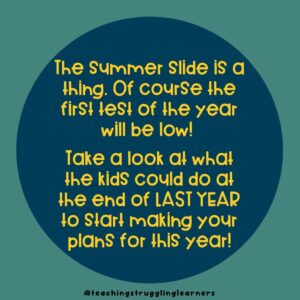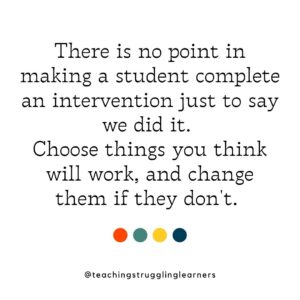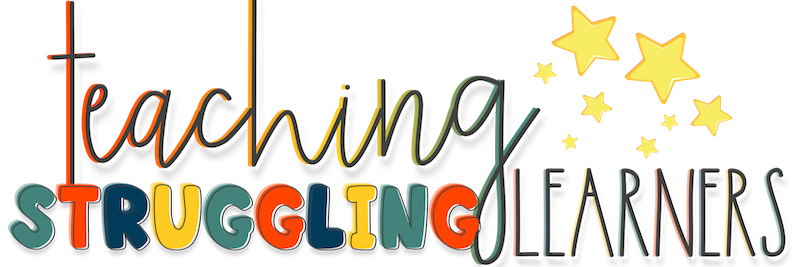Universal screeners start and end every school year. It’s one thing we can count on.

We all know the beginning of school is super stressful, and if you’re like me, it feels like we just stinking left from the craziest year ever! But, there is one thing we can count on when we get back into all of it. Our students are going to get hit with that beginning of the school year testing.
Universal screener testing is the official start to the race in a lot of schools. That testing is the starting point, off which all the growth that students make all year is based. So, it really is important, even if it is a pain in the butt to do it in the first few weeks of school.
Let’s take a minute to acknowledge that the summer slide is a thing.
It will be reflected in that first test. So, before you look at that first set of universal screeners data, keep in mind that it really isn’t as bad as it looks right there. The students ARE more capable than it shows there. But we still have a lot of work to do to get them where we want them to be.
Ok, now that we got that panic reducing piece of information out of the way. How the heck do we use the information the universal screeners give us?
Way too often, we get that data, marvel at how low our students are, make some quick plans to start a little lower than we thought, lower our expectations and get moving. The next time we look at that data will be after the next session of testing is complete.
I strongly suggest you take a second look at that data, and compare it to what your kids were able to do at the end of last school year.
You see, when we look at what they were able to do (and they will be able to do again), it gives us a better idea for the growth we should expect our kids to make. The kids have a lot of skills that they are rusty on from not using in the summer. That doesn’t mean they have lost them completely. Before you throw your expectations to the wind, take a deep breath and look at what the kids were able to do in the last assessment. Compare it to your first assessment.
Using both data points, make a choice about what quick review is needed versus what students need intensive support to help them get on grade level in a timely manner.

Once you’ve compared the universal screeners data, figure out which students need the highest amount of support.
Many universal screeners give a list of benchmarks that the student needs to master to meet the next level of skills. Take a look at the most basic skills that are listed and use that to delve a little deeper. Are there more basic skills that lead to that skill that the student is weak in. For example, if the student is struggling to blend letter sounds to make words, does the student know all their letter sounds fluently? Are they able to blend sounds without letters to make words? Those more basic skills, when missing, make all of the more advanced skills more difficult.
Once you’ve figured out the most basic skill that is weak, you know the point where you need to start your interventions.
Yes, I hear you upper grades teachers.
How are you going to work on phonemic awareness when the students clearly need to work on their comprehension???? But here’s the thing….all the practice in the world on comprehension strategies isn’t going to work if the student can’t read fluently. All the fluency practice in the world is going to give very little results if the student can’t decode. And decoding practice is only effective when students have the phonemic and phonological awareness skills they need.
No matter what age or grade the student is in, we have to meet students where they are in order to make true progress.
We have a limited amount of time, and we need to get the most out of the time that we do have.

So, after we know where we are starting for the individual students, take a look at the students who need the interventions. Group them so that they have similar interventions. Use the universal screeners information to help with this task.
All the students who need help on phonemic awareness or phonics should be grouped so that lesson plans and interventions can be provided appropriately. Weekly or bi-weekly progress checks help us to see if the skills we are teaching are making an impact and if the student isn’t making progress, clearly a changeup is needed.
There is no point in making a student complete an intervention just to say we did it. If the student isn’t making progress, change up what you’re doing! If we know it isn’t going to work, stop wasting time and find something that will! Students deserve that….and so do we as teachers. We deserve to see our students make big progress, we deserve to show that the hard work we put into our students pays off!
Once you have your basic skills identified, your groupings, and your idea on what you want to do…it’s time to get started progress monitoring!
